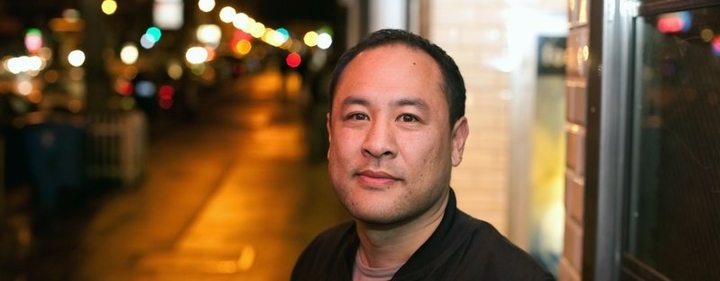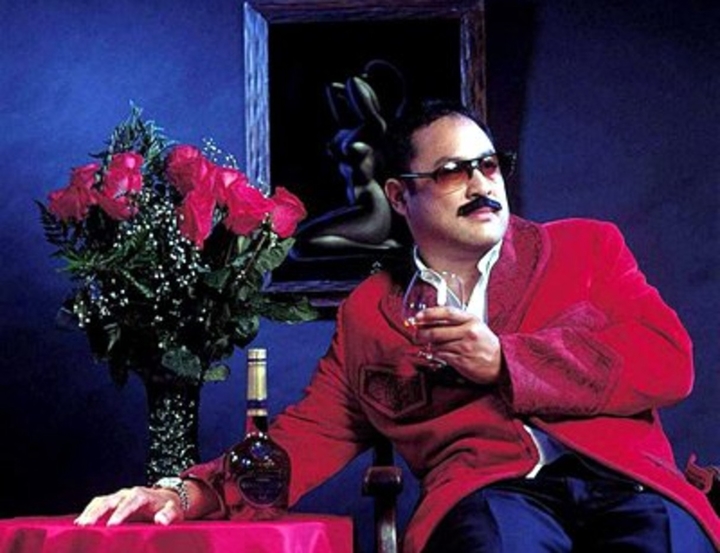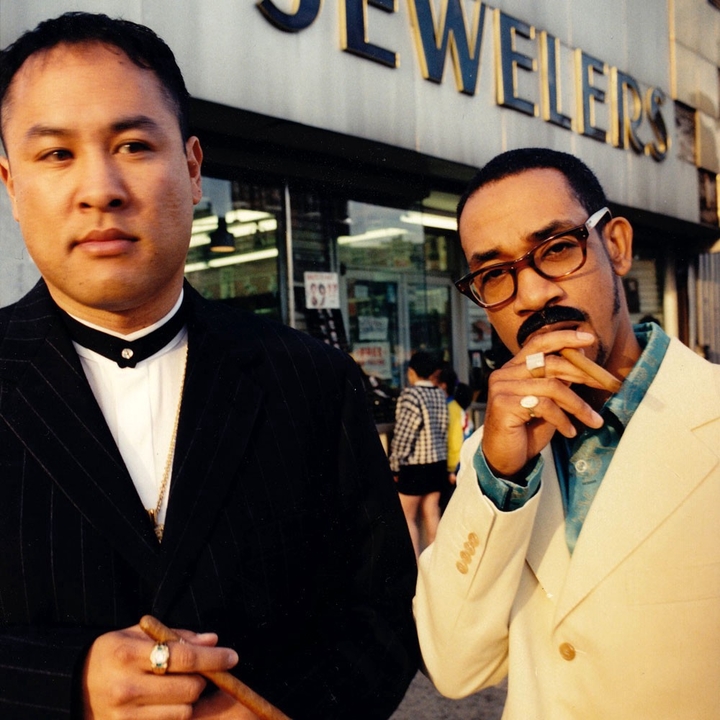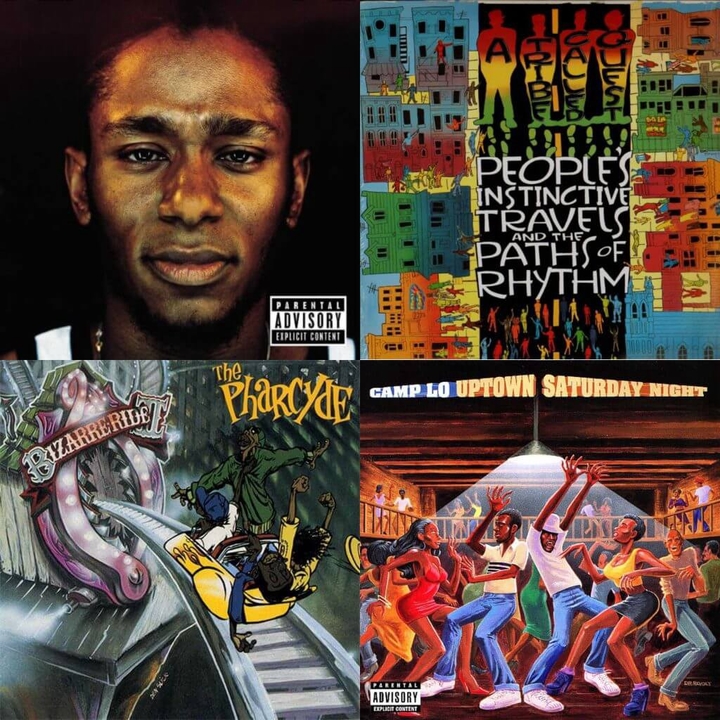
Automator: The Hitchcock of Hip-Hop?
A taste for the irreverent and a thirst for collaboration has driven the remarkably diverse career of producer Daniel “The Automator” Nakamura

For better or worse, Garry Mulholland mused in 2008, hip-hop music exists, with all of its encapsulated misanthropic ironies, as one of the most perfect soundtracks to a fucked-up planet. Such resonance perhaps explains its world-conquering popularity; Nelson George artfully describes the ascent thusly “moving from what was once a folk expression (hip-hop) has since matured into a multi-million dollar industry encompassing an array of products that sell across the spectrum of race, class and nationality.”
Given the universality of the culture, it’s unsurprising that hip-hop music wormed its way into my ears in the late 90s during a youth spent living in a dreary suburban town in the west country; a town separated geographically by 3000 miles of ocean from the Bronx yet still privy to the cultural shockwaves that have emanated from that hub since the late 70s. What’s perhaps slightly more surprising is that the figure who first pricked my ears was not a rapper but a producer.
In a point not often articulated within hip-hop critique, Tony Green concludes that the fertile mid to late 90s period of hip-hop revealed geniuses of sound rather than words. Swizz Beatz, Timbaland, and The Neptunes all came to prominence as stars in their own right — based largely on the strength of the beats they produced for artists — creating a curious paradox for rap music whereby the music element was often more memorable than the rap element.
In another buck to convention, it was not one of this prolific set of boardsmen that initially grabbed my attention in the late 90s. Many in my peer group of the dreary comprehensive school that I attended gravitated towards the carnal bounce of southern hip-hop issued by the likes of Usher and Ludacris (invariably produced by one of the afore-referenced). The potent blend of 808 boom and sexual imagery proved manna from heaven for virile teenagers wanting something to blast in their Vauxhall Corsa’s — I however demurred from the music’s evident charms. Instead, my entry point to hip-hop came from the project of an Asian-American producer from San Francisco called Dan the Automator.

I borrowed from a friend the first Handsome Boy Modelling School LP, that saw The Automator pair up with De La Soul and Stetsasonic producer Prince Paul. It stood out to me as something entirely different from the diamond dripping, pistol-whipping tales of braggadocio that were consumed by my cohort. The sonic richness of the music on the album was captivating to me: each track on the album succeeded in deftly welding together obscure samples, live instrumentation and an impressive shopping list of guest vocalist contributions from surprisingly disparate backgrounds. Whatsmore the record was rich in lyrical and conceptual detail, more akin to a movie than a rap album. This was music that made my head nod but also made my brain tick.

Since that first dose of The Automator, I resolved to consume every project he was involved in and consequently, I have incubated an on-off fascination with his career over the past twenty years. Whilst such fascination leaves me biased I believe it’s not an overstatement to say that Automator has had significant importance to the evolution of a compelling alternative to mainstream hip-hop music. Carrying the alternative baton from the Native Tounges era and into the new millennium, Nakamura’s most well-known projects coalesced with output from the likes of Antipop Consortium, MF Doom, El-P and Black Star to form a credible alternative strand of hip-hop. For many including myself, this alternative provided an entry point to hip-hop that presented itself as more accessible than the tales of murder, Maserati and Moët promulgated by the hip-hop mainstream.
Supposedly, critics flock to alternative rap because they can relate to its corny “liberal” lyrics, and no doubt some do. Me, I don’t think the lyrics are as clichéd as they’re made out to be, and I go to these records for music
Perhaps the best way to initially understand Nakamura’s importance in the world of hip-hop is to use a dichotomy that he himself used in a 2001 interview for the Wire with Peter Shapiro…
A lot of guys in Hip-Hop, they’re not producers, they’re beat makers. They make a beat and someone rhymes over, they practically send it to the guy. I’m a producer I tailor stuff and work with the people around me. Usually it ends up somewhere different than where we originally envisioned it, because of the energies of the people working on the project”
Automator couldn’t be further from the shadowy beat maker hunkered down in his basement churning out cookie-cutter productions to the highest bidder. Instead, his panoramic production mindset has seen him showcase the hip-hop LP as a space for thematic cosplay driven by goofball narratives that wouldn’t be out of place on a wonky b-movie (and are often sourced from exactly that).
Carrying on this cinematic comparison, The Automator’s unique set of skills parallels the singular directorial abilities of the Coen Brothers. The preternatural flair to hybridise genres, to take actors into uncharted territories in uncharacteristic roles and to create detail-rich, offbeat landscapes are features shared amongst the two camps. An Automator project just like a Coen’s film doesn’t fit neatly into one category other than its own.
“Hip-hop was always inventive,” Nakamura says. “Then the ’90s hit and everyone wants to be Dr. Dre; no one wants to be their own thing anymore. Everyone now wants to have the Lexus and deal pounds of drugs. We don’t do that. That’s not our lifestyle. You don’t see us coming out with the fur coat. There’s more to music than that.”
At this point, it would often be germane to dive into a backstory and for those looking for a detailed biography of Nakamura, it would be worth consulting the excellent Allmusic web article or else Wikipedia has a moderately detailed page. Biography will not be the focus of the remainder of this article. Instead, I’m going to plot a five-track musical digest that will acquaint the uninitiated listener with some of the key tropes in the Automator’s 30-year career.At this point, it would often be germane to dive into a backstory and for those looking for a detailed biography of Nakamura, it would be worth consulting the excellent Allmusic web article or else Wikipedia has a moderately detailed page. Biography will not be the focus of the remainder of this article. Instead, I’m going to plot a five-track musical digest that will acquaint the uninitiated listener with some of the key tropes in the Automator’s 30-year career.
Dan The Automator — Music To Be Murdered By (1989)
After a few tentative steps into the world of production with beats written for King Tech and MC Sway’s “Flynamic Force” EP on All City Records, Nakamura stepped out with a solo 12" on HomeBass records in 1989. Besides the glorious neo-noir cover, the music is very much as one would expect of the era albeit with a lot of the flourishes that would become Automator leitmotifs.
The title track neatly demonstrates Automator’s curatorial abilities. A cut and paste “Lessons” style collage built out of classic breaks spliced with a dizzying array of snippets from hip-hop and r’n’b records of the era. What’s remarkable here is that even though The Automator hadn’t yet established the contact book to physically assemble a cast of guests to rap and sing on his records, he was still able to do so with a little Akai alchemy. Hip-hop Hitchcock presents himself to the world, corralling his performers together for a tale of the unusual.
Dr Octagon — Earth People
Built on a rock-solid bed of 808 drums pilfered from Whodini, topped off with a succulent doom ridden synth motif, this track knocks harder than a grumpy postman. A hip-hop heater pure and simple, but more than that, it marks a huge breakthrough moment for The Automator. A moment when his nascent talent for showcasing and enhancing the storytelling talent of an eccentric voice came to the fore. Here the voice is Kool Keith Thornton, formerly of the Ultramagnetic MCs, who when furnished with the alter ego of Dr. Octagon- a time-travelling gynaecologist-excelled in delivering a psychedelic spew of non-sequiturs and paranoid skits that for many marked a high point in his career post-UMC disbandment.
Handsome Boy Modelling School — Megaton B-Boy 2000
Jokingly billing itself as a musical curriculum, the Handsome Boy Modelling School project was loosely based on ‘The Prettiest Week of My Life,’ an episode from a short-lived Fox sitcom Get a Life (1990–92). The inaugural album features an all-star cast of performers including DJ Shadow, Mike D, Sean Lennon, Róisín Murphy, Money Mark, and EL-P.
I’ve already sung the praises of the album as a whole earlier and so focus should now be drawn to this brooding hulk of a track sitting at the tail end of the LP. Programmed by digital hardcore enfant terrible Alec Empire, ‘Megaton B-Boy’ is conventional hip-hop processed until painful. Distorted bass and trashy snares mix perfectly with the caustic vocal delivered by Def Jux kingpin El-P. A bruiser that carves out its own sub-genre tags, crushed-hop anyone? It’s indicative of the forward-focused sound of the track that I hear similarities in contemporary recordings namely Noods faves Franco Franco & Kinlaw and their 2019 track “Cuore Molle Palle Mosce”. And furthermore, it’s a testament of The Automators talismanic ability to pair unlikely bedfellows such as Empire and El-P who yield future-proof nuggets like this.
Jamie Cullum Featuring Roots Manuva – Love For $ale
Generally speaking, I think Jamie Cullum is a grade-A twonk. An obnoxious little fart of a man who pedals out painfully overwrought piano jazz covers to a rapt audience of tagine scoffing middle-class fuds. Yet, with The Automator at the helm, the impossible is achieved. I like what I hear on this track! A cover of the classic Cole Porter standard this version sees Automator underpin Cullum’s, surprisingly palatable, vocal performance with a glorious low slung funk groove dappled with space echo dub rinses and minimal organ flourishes, and topped off with a few verses from Mr Rodney “Rooty Tooty Manuva” Smith.
This track sits not as an oddity in the Automator’s oeuvre but as a way-marker that shows the directional shift his career had taken since the early 00s. By the time this track had been written in 2013, Nakamura had spent an increasing amount of his time producing guitar bands rather than rappers at his San Francisco studio the Glue Factory. The Jon Spencer Blues Explosion, Kasabian and Little Barrie were amongst some of the bands to have received the Automator treatment — a testament to the versatility of his production skills. One can’t imagine the likes of Jermaine Dupri, despite his significant talent, manning the faders for a bunch of hairy rockers but for Nakamura, his zest for new projects has allowed him to leapfrog hard-baked genre boundaries with ease.
Dan The Automator — Amy Devastated
As with his move to producing for guitar bands, the Booksmart OST exists as a testament to the considerable versatility of Nakamura to seek out and excel in new musical environs. It’s probably hugely edifying for Nakamura to look back on his 30-year plus career, marked by its diversity and influence on others, and believe that the road he chose was the right one; what the world lost in a battle DJ we gained in a remarkable, inspiring and catalysing production talent. Automator on the faders, I salute you!
Last year Nakamura released his first foray in scoring for the movies. The tender coming-of-age teen comedy Booksmart was graced by a Dan The Automator soundtrack. Given the cinematic quality of his work, it’s an unsurprising leap. This emotional slice of kinetic electro-pop stands out as a favourite on the album.
Aside from RZA, it’s hard to think of many other hip hop producers who have taken the leap from writing beats for rappers to scoring music for the big screen. The discipline is entirely unto itself, with the music having a subservience to the images that it supports rather than the embellishing the bars of a rapper.
As with his move to producing for guitar bands, the Booksmart OST exists as a testament to the considerable versatility of Nakamura to seek out and excel in new musical environs. It’s probably hugely edifying for Nakamura to look back on his 30-year plus career, marked by its diversity and influence on others, and believe that the road he chose was the right one; what the world lost in a battle DJ we gained in a remarkable, inspiring and catalysing production talent. Automator on the faders, I salute you!

